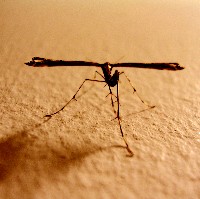10 December 2014. Researchers from biotechnology company Integral Molecular and Blood Systems Research Institute identified and tested with lab animals a human antibody that limits viral activity causing chikungunya, a mosquito-borne disease spreading in the Western hemisphere. The team led by Integral Molecular CEO Benjamin Doranz published its findings in this month’s issue of Journal of Virology (paid subscription required).
Chikungunya is a disease caused by viruses carried by mosquitoes that results in symptoms similar to arthritis, such joint pain and swelling, but also fever, headache, muscle pain, and rash that can persist for months or years. Before 2013, chikungunya occurred in Africa, Asia, Europe and islands in the Pacific and Indian oceans. Beginning in 2013, however, cases of the disease were reported in the Caribbean, and has since spread to countries in South and North America, including the U.S. There are no treatments or vaccines to prevent getting chikungunya.
Integral Molecular, in Philadelphia, develops engineered antibodies that target proteins on membranes of cells that act as receptors of signals and move molecules into and out of cells. While cell membranes have similar basic functions, the proteins expressed can vary widely. The company’s technology, licensed from University of Pennsylvania, identifies antibodies that address specialized native cell membrane proteins, and engineer more capabilities into the antibodies if needed.
In the collaboration with Blood Systems Research Institute, Doranz and colleagues used a phage display, a device that screens interactions among proteins and DNA. The device was primed with virus-like particles developed by the company, that isolated 7 highly-specific human antibodies from patients with chikungunya.
One of the antibodies showed a greater ability than others to protect against chikungunya viruses. Tests with lab animals, conducted at Blood Systems Research Institute, showed this one antibody was able to provide protection from infection for 24 hours after exposure to the virus. Mapping of epitopes — sites on antigens that trigger T and B cell responses from the immune system — further clarified molecular binding sites on the virus surface that Integral Molecular says will help in the design of therapies or vaccines.
The antibody isolated and tested in the paper, code-named IM-CKV063 by Integral Molecular is, according to the company, one of the most potent antibodies against chikungunya discovered. “Given the rapid spread of this virus and the lack of specific treatment options,” says Doranz in a company statement, “we are committed to developing this fully human antibody into a first-in-class therapeutic.”
Read more:
- Ebola-Marburg Vaccine Development, Testing Contract Awarded
- Project Developing DNA Antibodies for Infectious Diseases
- Drug Screening Target Designed for All Ebola Types
- Johnson & Johnson Acquires Biotech Developing Anti-Virals
- Gene Editing Techniques Devised to Combat Superbugs
* * *


 RSS - Posts
RSS - Posts
You must be logged in to post a comment.